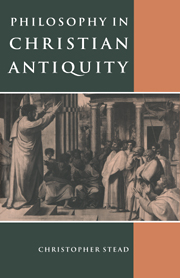Book contents
- Frontmatter
- Contents
- Preface
- List of abbreviations
- PART I THE PHILOSOPHICAL BACKGROUND
- PART II THE USE OF PHILOSOPHY IN CHRISTIAN THEOLOGY
- 8 The debate about Christian philosophy
- 9 Greek and Hebrew conceptions of God
- 10 Proofs of the existence of God
- 11 God as simple unchanging Being
- 12 How God is described
- 13 Logos and Spirit
- 14 Unity of substance
- 15 Substance and Persons
- 16 Christ as God and Man
- 17 Two natures united
- PART III AUGUSTINE
- Bibliography
- Index of Names
- Index of Subjects
11 - God as simple unchanging Being
Published online by Cambridge University Press: 29 September 2009
- Frontmatter
- Contents
- Preface
- List of abbreviations
- PART I THE PHILOSOPHICAL BACKGROUND
- PART II THE USE OF PHILOSOPHY IN CHRISTIAN THEOLOGY
- 8 The debate about Christian philosophy
- 9 Greek and Hebrew conceptions of God
- 10 Proofs of the existence of God
- 11 God as simple unchanging Being
- 12 How God is described
- 13 Logos and Spirit
- 14 Unity of substance
- 15 Substance and Persons
- 16 Christ as God and Man
- 17 Two natures united
- PART III AUGUSTINE
- Bibliography
- Index of Names
- Index of Subjects
Summary
Christian writers naturally turned to the Bible for their teaching on the nature of God. But their use of it was often influenced by the philosophical thought of their own day. The Hebrews, we saw in Chapter 9, pictured the God whom they worshipped as having a body and mind like our own, though transcending humanity in the splendour of his appearance, in his power, his wisdom, and the constancy of his care for his creatures. Such a conception, set out in the earlier books of the Old Testament, retained its authority despite some later changes of emphasis. But this biblical view, we noted on p. 58, was radically modified in the teaching of Philo of Alexandria. Philo, a devout Jew, does indeed insist on God's moral attributes: his patience, his wisdom and his loving care. But he also presents him as the metaphysical first principal of the universe, without bodily form or human passions, indeed without any sensible qualities: a perfectly simple, unchangeable, unfathomable being, who can only be positively described in the words of Exodus 3:14 as ‘He who Is’.
Christian writers developed a broadly similar view, partly because they were influenced by the same philosophical authorities, partly through direct imitation of Philo himself. To this they added their doctrine of the Trinity, which will concern us later; here too their thinking was influenced by Philo, especially in his conception of the divine Logos; but there was less in the way of actual borrowing.
- Type
- Chapter
- Information
- Philosophy in Christian Antiquity , pp. 120 - 135Publisher: Cambridge University PressPrint publication year: 1994

